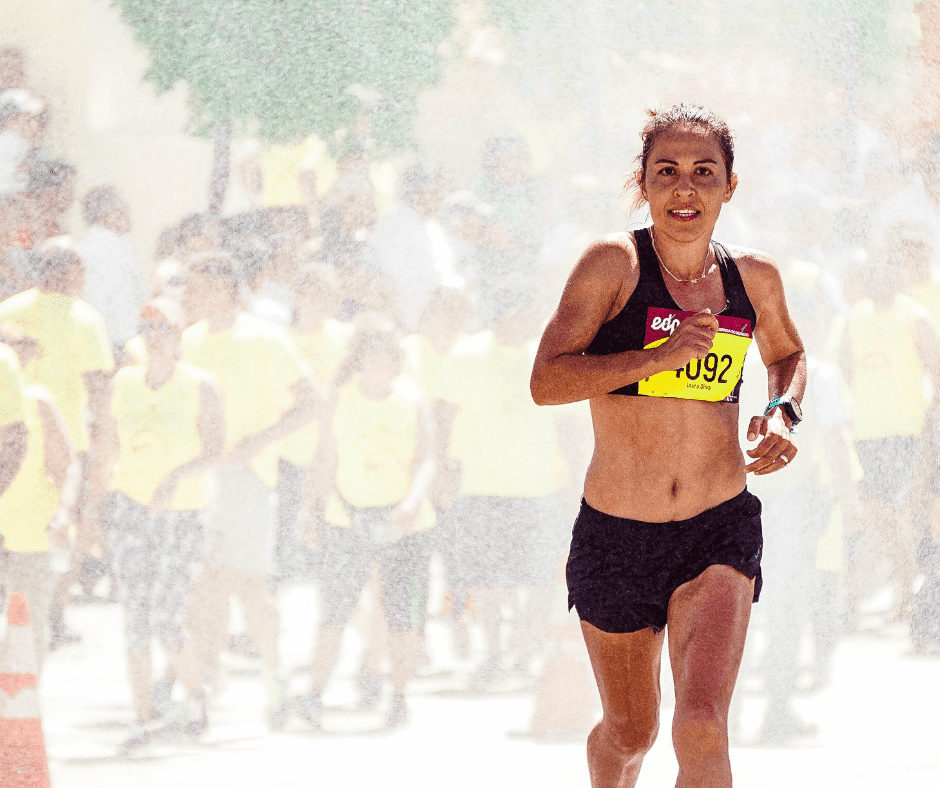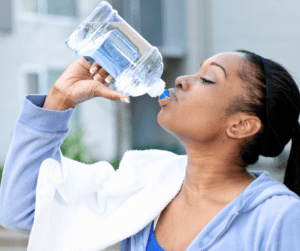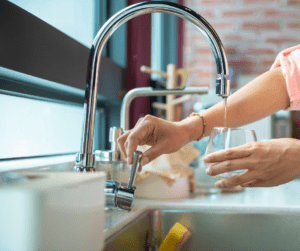We can survive for as long as a month in a moderate climate without food…
We would struggle to stay alive for longer than two days in desert conditions without water.
It’s safe to say that after oxygen, water is a close second on the list of essentials for life.
Failing to prepare an adequate hydration strategy before race day can lead to unwanted consequences. Dehydration can cause a decrease in your aerobic energy capacity, which will reduce your exercise endurance and muscle strength.
What about when you decide to run 26.2 miles…
How much is too much…
What happens if you don’t drink enough…
Let’s have a look.

How To Hydrate For a Marathon
Water has various functions in the body such as transport of nutrients to the active tissues, getting rid of waste products, and temperature regulation.
Temperature and hydration influence your running performance…
A lot of people don’t realize the health implications that come with dehydration but should also be aware of the dangers of overhydration during exercise.
During any exercise, you must aim to be well hydrated.
Firstly, to get rid of the waste products, which are the result of your muscles working. Secondly, to deliver oxygen and nutrients. It doesn’t help if we eat all the correct things and then they don’t get delivered to the muscle due to dehydration. Thirdly and very importantly for thermal regulation.
As soon as you start to run your marathon, you start to dehydrate. About 75% of the energy you put into exercise is converted into heat and is then lost.

Water requirements change based on an individual’s sweat rate, this will also be affected by heat, humidity, and the intensity you are running at.
The most important part of hydrating for a marathon happens way before you even get to the start line…
An effort must be made to stay well hydrated at least 48 hours before the start of your marathon.
You should start sipping about 600ml of water three to four hours before the race, and drink until your urine is clear. If it still isn’t clear, drink another 400ml on top of this
If you consume an entire liter of water just before you run, you stand the chance of diluting your sodium balance, being bloated, and increasing your need for bathroom stops along the way.
How Often You Should Hydrate During a Marathon
You should aim to consume 400ml to 800ml of water an hour – As we said earlier this amount does vary between each individual and should be modified to thirst, intensity, and environmental conditions.
We recommend that you learn how much water your body needs to consume to stay well hydrated during your training period, especially on your long runs.
You can do this by checking your weight before and after a long run to make sure that you haven’t lost more than 2 percent of your body weight, and checking that your urine is not too concentrated.
A good way to tell is with a urine color chart:
If it’s a very light straw color or a very light yellow color, you’re good to go run and enjoy it.
If it is very dark or even orangey, then it means you are probably in a dehydrated state, especially the first morning batch of urine. I would suggest that you first drink something with a sodium content and wait about 20 to 30 minutes.
I know a lot of runners don’t have this opportunity because they may be running in the mornings. But those of us that can do this, should.
For those that run in the morning, it would be adequate to drink about 500mls of fluid an hour before you run.
Remember that if there’s a little bit of fluid in the stomach, it makes the body better at delivering the fluid throughout your run to the areas where it should go. So it’s always better to run with what we call a residual volume of fluid.
How Elite Runners Hydrate For Marathons
Research that was conducted on London Marathon participants showed us that despite the organizers providing advice on strategies to avoid hyponatremia, 12% of participants still planned to consume fluid levels that would put them at risk.
This is considering that 93% of runners acknowledged they had read and understood the provided hydration information package.
Hyponatremia: A condition that occurs when the level of sodium in the blood is too low. With this condition, the body holds onto too much water. This dilutes the amount of sodium in the blood and causes levels to be low.
Symptoms include nausea, headaches, confusion, and fatigue.
Elite athletes plan to drink every 5km and most consume gels at around the 10-15km and 25-30km marks.
Drinking every 5km can be quite an aggressive hydration strategy. In our opinion, fluid quantity needs to be monitored more carefully to avoid hyponatremia.
If you find that you want to consume gels, make sure to do so with water so that they are easier to digest.
Marathon Hydration Plan

Hydration Before The Marathon:
- Do not just drink lots of water in the build-up to the race. This will increase your chances of getting hyponatremia.
- Drink an electrolyte drink the night before the race to boost your blood plasma volume.
- Drink about 2-3 ml per pound of body weight at least 4 hours before your run.
Hydration During The Marathon:
Personalizing your hydration strategy will make a tangible difference to your result. That’s because everyone loses a different amount of sodium in their sweat.
Just drinking water when sweating over long periods dilutes your sodium levels, which can really impact your performance and could lead to hyponatremia.
Although there are regular drink stations on the course, these are not in place so that you stop to drink at every station.
Think about how much fluid you consumed during your long training runs, and try to replicate this intake when running the marathon, adjusting to thirst and environmental conditions.
Stop only for drinks and fuel as you have planned in your training.
Everything You Need To Know About Electrolytes & Salt Tablets During A Marathon
The only people that would need salt tablets would be those in very extreme endurance events that are performed in very hot and humid conditions.
For normal marathon runners, sports drinks are good enough, I suggest even adding a pinch of salt to your drink but that’s about it.

The sodium concentration in sports drinks is usually 23 to 69 milligrams per deciliter. That is enough to look after our electrolyte intake without taking excess electrolyte supplementation.
To look at further electrolyte replacement, we usually look at it in the terms of food, so you could eat a salty snack, like a salty biscuit or salty nuts and pretzels.
People following a Keto diet, those that are on diuretic medication for blood pressure, or anybody with a stomach bug, should look at their electrolyte intake more aggressively because you do lose more electrolytes in these instances.
Symptoms Of Low Electrolyte Levels:
- Nausea
- Excessive Tiredness
- Weakened Muscles
- Spasms
If you feel any of these symptoms you should consider taking electrolytes, adding salt to your water, and even loading up on plant foods like bananas, greens, nuts, and seeds.
Check out this super helpful article we wrote about running a marathon with a hydration pack: Read it here.




Comments are closed.